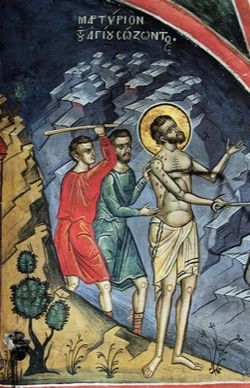Sozon of Cilicia | |
|---|---|
 |
Sozon of Cilicia was an early Christian martyr from Lycaonia. Originally a pagan shepherd named Tarasios, he was baptised and received the name Sozon.
His feast day in the Orthodox Church is September 7. [1] He is the patron saint of the island of Lemnos. [2]
His feast day in the Catholic Church is also September 7, although he is referred to as Saint Sozonte of Pompeiopolis, a ruined city near modern Taşköprü, Turkey, in the 2004 Martyrologium Romanum. [3]